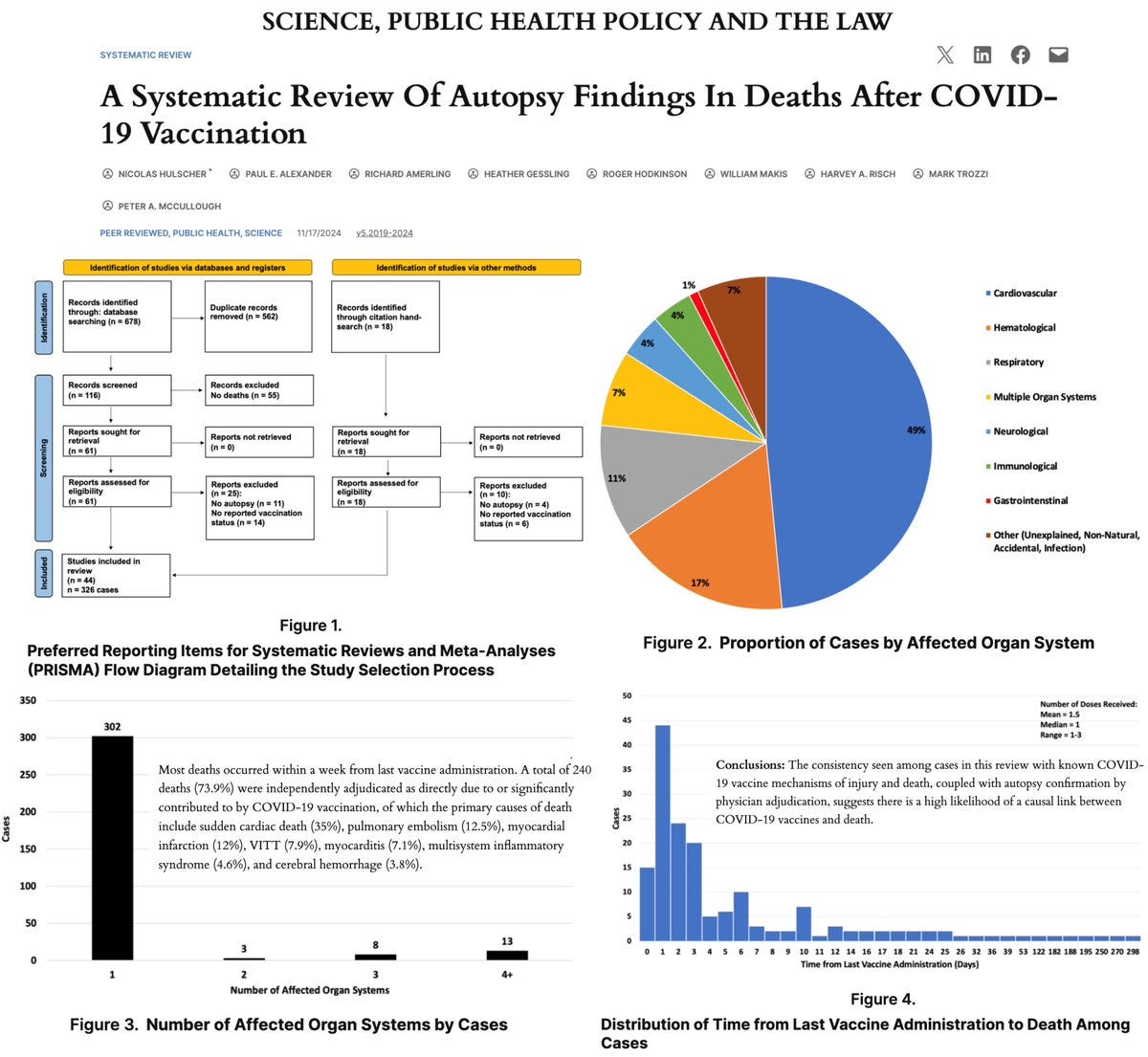New Study: A Systematic Review of Autopsy Findings in Deaths Following COVID-19 Vaccination
Science, Public Health Policy & the Law
James Lyons-Weiler, PhD
Editor-in-Chief, Science, Public Health Policy, and the Law, Author, Popular Rationalism, Founder IPAK and IPAK-EDU.org
“Contributed risk from other factors, however, does not exonerate the vaccine, which was used on patients with, and without those risk factors.”
Introduction: Investigating Unanswered Questions
The COVID-19 vaccination program is one of the largest global public health initiatives in history. With over 13 billion doses administered worldwide, serious adverse events must be systematically studied to ensure safety. A newly published systematic review, A Systematic Review of Autopsy Findings in Deaths After COVID-19 Vaccination, by Hulscher et al., examines the role of vaccines in post-mortem cases.
This study reviews 325 autopsy cases, concluding that 73.9% of the deaths were causally linked to COVID-19 vaccination. The leading causes of death included sudden cardiac events, thromboembolic complications, myocarditis, and immune-mediated conditions such as vaccine-induced immune thrombotic thrombocytopenia (VITT). These findings underscore the importance of continuous monitoring and investigation.
Key Findings and Their Context
Of the 325 cases reviewed, causality was assessed using clearly described, standardized criteria, revealing:
Sudden cardiac death accounted for 35% of vaccine-related cases.
Thromboembolic events (pulmonary embolism and VITT) represented significant contributors at 12.5% and 7.9%, respectively.
Myocardial infarction (12%), myocarditis (7.1%), and multisystem inflammatory syndrome (4.6%) were also implicated.
These findings raise sound concerns. Causality assessments in autopsy studies rely on detailed pathological examinations and clinical correlation. These methods are robust in spite of a few hypothetical limitations, such as increased risk due to pre-existing conditions, which may be understudied due to incomplete medical histories.
Implications for Public Health and Policy
The results provide impetus for a call for a reevaluation of current surveillance systems and highlight gaps in post-vaccine mortality investigations. Key recommendations include:
Comprehensive Monitoring: Improved long-term monitoring of vaccine recipients to detect and mitigate rare adverse events.
Autopsy Standardization: Mandating standardized autopsies for all unexpected deaths temporally related to vaccination to ensure accurate causality assessment.
Enhanced Reporting Systems: Strengthening adverse event reporting frameworks like VAERS to address underreporting and improve data quality.
In my professional opinion, all coroners should find and report the last date of vaccination from any vaccine in any unexpected death not involving deaths clearly due to accidents or violence.
Public health efforts must balance the known benefits of COVID-19 vaccination with transparency in addressing potential risks. Ensuring trust in vaccination programs requires openness and accountability.
The Role of Scientific Inquiry
This study represents a step forward in understanding the safety profile of COVID-19 vaccines. The authors are quite objective in the statement of limitations of their study, and make clear that the findings must be interpreted within the broader context of baseline rates of pre-existing conditions. Contributed risk from other factors, however, does not exonerate the vaccine, which was used on patients with, and without those risk factors. This is important, especially in populations with high vaccination coverage. Rigorous, independent studies are essential to advance our knowledge and guide evidence-based policy.
Conclusion: A Call for Collaborative Investigation
The findings presented in this systematic review are a reminder of the complexity inherent in large-scale public health interventions. By prioritizing transparency and fostering open scientific inquiry, we can ensure that vaccine programs are both effective and safe for all populations.
This editorial calls for the scientific community, public health agencies, and policymakers to engage in collaborative efforts to investigate, address, and communicate vaccine-related risks. Through balanced, evidence-driven approaches, we can uphold public trust while safeguarding health outcomes.
Science thrives on transparency. Only through critical investigation and rational discourse can we refine our understanding and optimize public health.
You can subscribe to Popular Rationalism here:
And you can subscribe to Science, Public Health Policy & the Law by joining The World Society for Ethical Science.





It's time we stopped saying "safety profile" and replaced it with "risk profile."
The words safety and vaccines do not belong in the same sentence.
With Kennedy as potential HHS your contributions are so important. We need people like you to keep pushing. I’m just a rapper😵💫